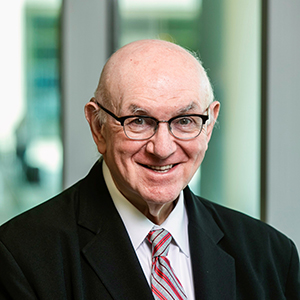In This Story

When Professor Emeritus Bill Schneider established a fund to help public policy students at George Mason University’s Schar School of Policy and Government, he had only one stipulation.
“The only condition I placed on it was a relative preference should be given to students whose parents do not have college degrees,” he said.
While a full 33 percent of Mason’s students are “first-generation” college students, Schneider’s distinction takes in those whose parents may have gone to college but for whatever reason did not complete a degree program.
“Lots of people go to college, but they never get a degree, and that includes my own parents,” he said. “I gave [the gift] so there would be more students from underprivileged backgrounds who would have an opportunity to study at the Schar School.”
The $250,000 Bill Schneider Endowed Scholarship benefits full-time, in-state students who qualify on the basis of merit and financial need, with preference given to those whose parents do not have bachelor’s degrees.
The Portsmouth, Virginia, native was the beneficiary of higher education benefactors, which, after graduating from Brandeis University on a scholarship from his hometown newspaper and a PhD fellowship at Harvard University, led to his 30-year career in journalism, including stints at the Los Angeles Times and the Atlantic magazine. For 21 of those years, he covered American politics—and became a familiar election night pundit—for CNN. (These days his commentary can be found on Substack, @bschneiderdc.)
Clearly, Schneider’s background influences his generosity, as well as an intention to contribute helping sustain Virginia’s standing as one of the best educated states in the United States and an effort to close what he called “the diploma divide.”
“Virginia is an unusual Southern state,” said the second-generation Virginian. “Virginia is one of the 10 best educated states in the country. It's one of the top 10 states in terms of the percentage of the residents in Virginia who have a college degree, more than any other southern state.
“That's an important factor in this year's election because this year the ‘diploma divide,’ as we call it—the division between people with college degrees and people who don't have college degrees—has gotten very wide. More Americans should be educated, I think. College education, no matter what you study, is an important part of citizenship. So, the diploma divide has become a really important factor in American politics.”
Schneider taught at Mason for 12 years, brought to the school by his Harvard PhD advisor and one of the founders of what is now the Schar School, Seymour Martin Lipset, an acclaimed social scientist and author of groundbreaking theories on economic development and democracy. The connection between economic status and democracy is not lost on Schneider, who sees education as vital to combating increasing threats to democracy.
Schneider’s mother started classes at the College of William & Mary but was forced to quit to find employment. His father went to the City College of New York—“he was one of the brightest students,” he said—but after the attack on Pearl Harbor he was drafted to serve overseas in World War II, cutting short his college career.
“Half the people who start college don’t ever get a four-year degree,” Schneider said. “That’s why I wanted the scholarship to give priority to students whose parents do not have a college degree, rather than those whose parents did not go to college.”
Because of the undergraduate scholarship and the PhD fellowship, “I graduated college and graduate school without any debts,” he said. “It sounds remarkable, because many people have crushing debts when they get their degrees, but I was very lucky. And I wanted to make that possible for more students today.”
If you would like to get involved with the Schar School alumni network please reach out to Nicole Kelleher at nkelleh@gmu.edu. To make an impact on students’ lives, consider making a gift using this link. To learn more about the various ways you can support the Schar School of Policy and Government, please contact Cindy Michelson at cmichel2@gmu.edu.
